Due to the fragility of capitalism and the inept response by the government to help those who are economically affected by COVID-19, the United States is currently at the precipice of an eviction crisis. The CARES Act eviction moratorium expired at the end of July. Somewhat thankfully, the Centers for Disease Control and Prevention (CDC) issued an emergency order barring certain evictions through the end of the year starting on September 4th. However in between those two points in time, there was a large spike in evictions, particularly in cities without their own eviction moratorium. Without a rent forgiveness plan, many evictions are only being delayed a few more months as workers also struggle to find work or receive enough in unemployment to pay for their necessities.
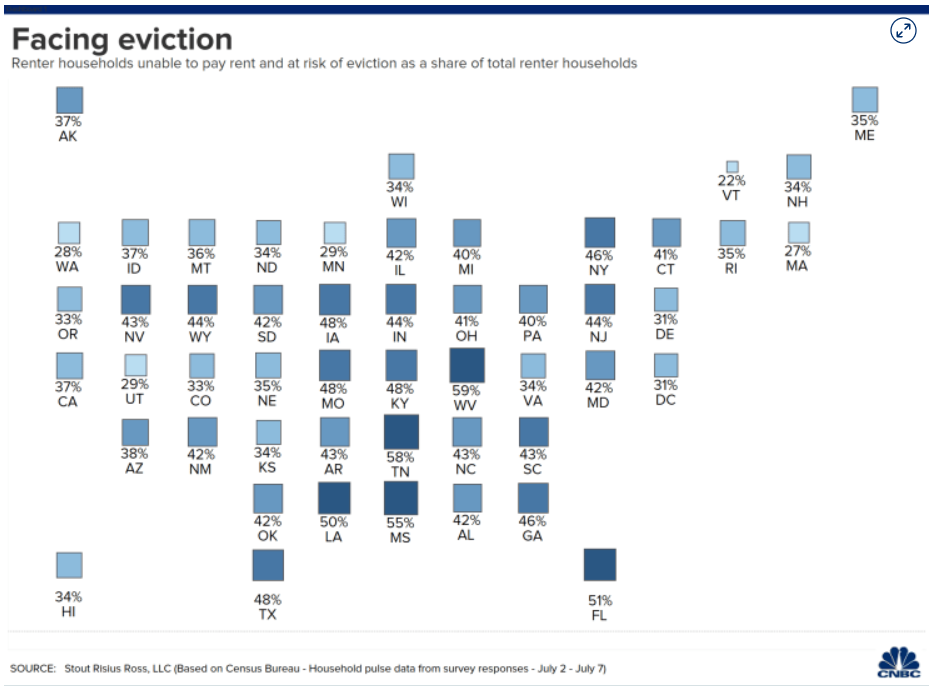
A disaster waiting to happen if many landlords get what they want
I think we can say that the CDC eviction moratorium is certainly helping many families stay housed as before the moratorium there was an estimated 30-40 million renters at risk of eviction. It’s much more difficult to say whether this will last much longer after the end of the year when it expires as landlords and the majority of courts which favor landlords square off against renters and community organizers. Disastrously, if evictions are allowed to continue without pushback it would likely lead to an increase in COVID-19 infections as people crowd homeless shelters and physically need to go to organizations to get the help they desperately need. I found one glimmer of hope at least in New Orleans where protesters completely blocked the entrance to eviction courts when landlords tried to go through with their evictions.
With or without the virus, the future of housing doesn’t look good if we take a look at the technological trends in the parasite -err I mean landlording industry. On one end we have the nightmare of Alexa for Landlords from our friends at Amazon where “landlords can set special Alexa commands that will let their residents pay rent, submit maintenance requests, and manage other things that normally come with the territory of renting an apartment or other dwelling.” Amazon-associated technologists may tell you this is just the future of the “smart home” vision like the Jetsons or something but in reality sounds more like the 1984 Big Brother cliché. In other words, landlords can now do even less while making money off of tenant rent-extraction solely through the ownership of property.
Of course as the idea of smart homes expands in the consumer world, using similar technology to then physically connect (or be kept away from) with the outside world, we also have the “smart city” narrative being pushed as well. The way in which capitalist techno-utopians are proposing to facilitate this future is through smart locks combined with cryptocurency. Why? Imagine for a second. You’ve just gotten back home from work and you try to open the Amazon smart lock to your apartment, which you rent from an “innovative” landlord. Key card denied. Oh no, looks like you forgot to send the monthly rent which you pay in cryptocurrency that the smart lock checks to be sure you paid rent and allow you to enter your rented apartment. Now imagine this but living in late-stage capitalism and barely able to make ends meet. You may or may not have the crypto to pay for it. There are companies actively working on this. Sounds pretty dystopian to me!
So what, everyone should have housing?
In short, yes, housing should be a human right. In fact it was something that was meant to be a right in the United States had FDR passed his Economic Bill of Rights before he died but unfortunately today, most jurisdictions in the United States guarantee no right to housing. This should anger everyone when a place like San Francisco has nearly five empty homes per homeless resident which is really an unsurprising thing to occur when rents have been rising more than incomes all over the US every year since 2001 which increases the probability of people being displaced from their homes. San Francisco’s tech bubble doesn’t help as those who benefited from it are able to afford multiple homes for investment while most are not even able to afford one.
But what are the mechanisms that allow for such an atrocious system to exist considering most countries, including the US, recognize housing as a human right in the Universal Declaration of Human Rights (UDHR) adopted by the UN?
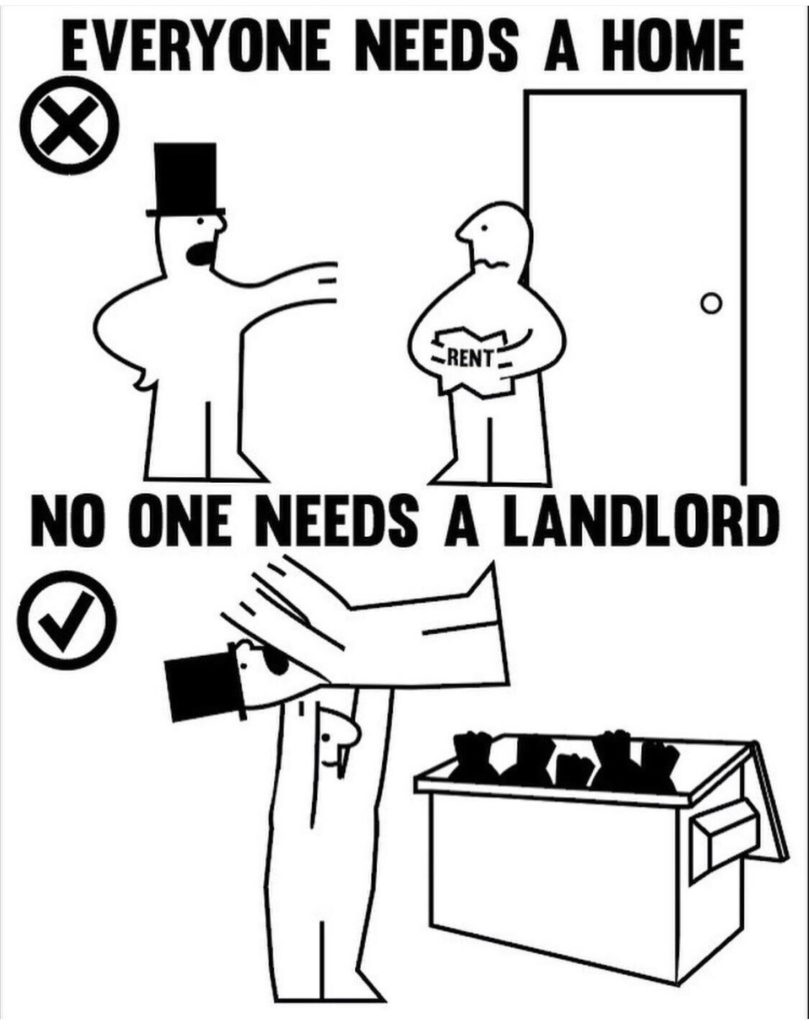
Landlords are simply middlemen which extract rent from those who don’t own property
That’s right, it’s ~landlords~. In all honesty, it’s not really the landlords’ fault that we have this problem, they are simply acting “rational” within a society that allows for real estate to be bought and sold on a market, and they want profit as any business does. However we can’t ignore the consequences for allowing this as a society. The landlord problem is one that is deeply rooted in the concept of private property and has been one that’s been going on long before COVID-19 ever started. By allocating housing by ability to pay, rather than need, we create homelessness which has a lot of physical and mental effects on those who become homeless and thus further downstream affects for society as a whole.
For more reasons on why the landlord system sucks, check out this video by Thought Slime.
What’s your proposed solution then?
A few months ago we held the first Blockchain 101 for Socialists Livestream in the Crypto Leftists discord group. After an explanation of the history of the rise of cryptocurrencies and how blockchain works I presented a few different use cases that I think leftists could find useful or interesting. One of the examples I used was for the public ownership and governance of real estate property using Mario and Luigi in the Mushroom Kingdom as examples.
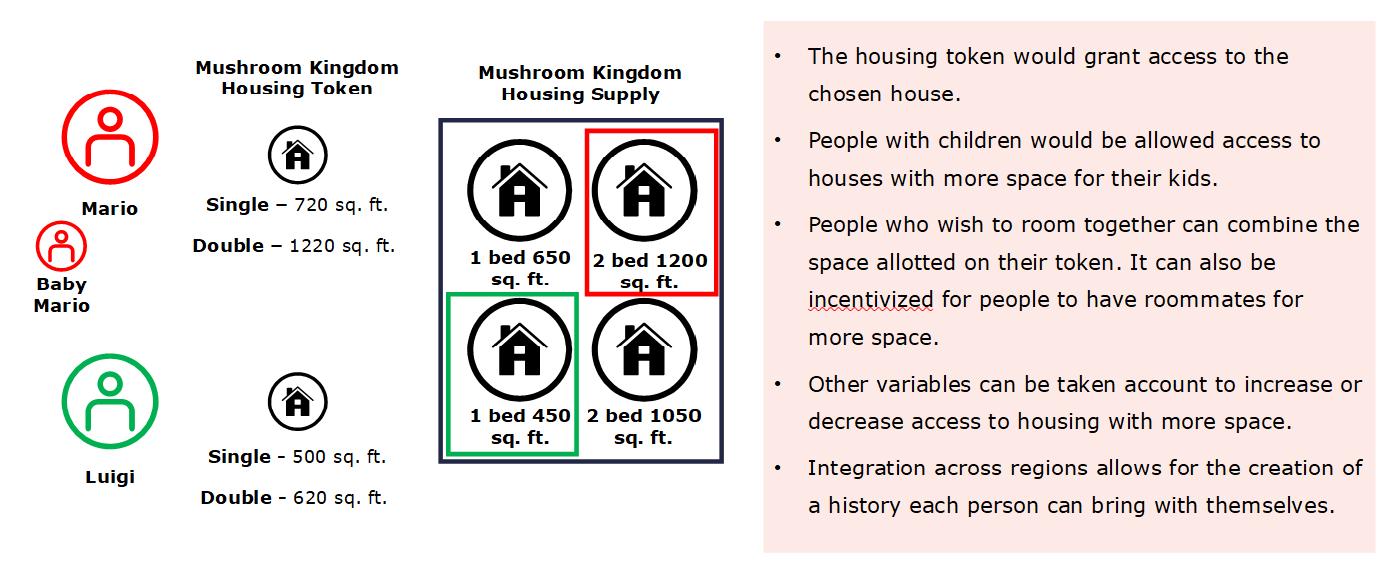
Imagining the Mushroom Kingdom as a commune where housing was held in common and which the right to housing is represented by a digital token held on some DLT infrastructure
In this example, we assume that the Mushroom Kingdom has seized all the property in the land and has put it all in common to its citizens. Since the leftist ruling party is very innovative and they would like to start creating institutions which do not rely on the party bureaucracy or their stability in power in the long term and can take democratic input from citizens, they’ve decided to use a blockchain enabled platform to distribute the housing resources they hold in common.
On this platform, Mario and Luigi are able to see their housing right token being held in the blockchain wallet which gives them a right to certain sizes of houses depending on their situation. Since Mario is a single father, he has a right to bigger homes than Luigi who is planning to live alone. After they’ve taken a look at the housing supply, Mario and Luigi have chosen the homes they want as shown by the red and green squares in the image above. By spending their housing token on their house, they now have access to those homes and this is recorded on the immutable blockchain ledger.
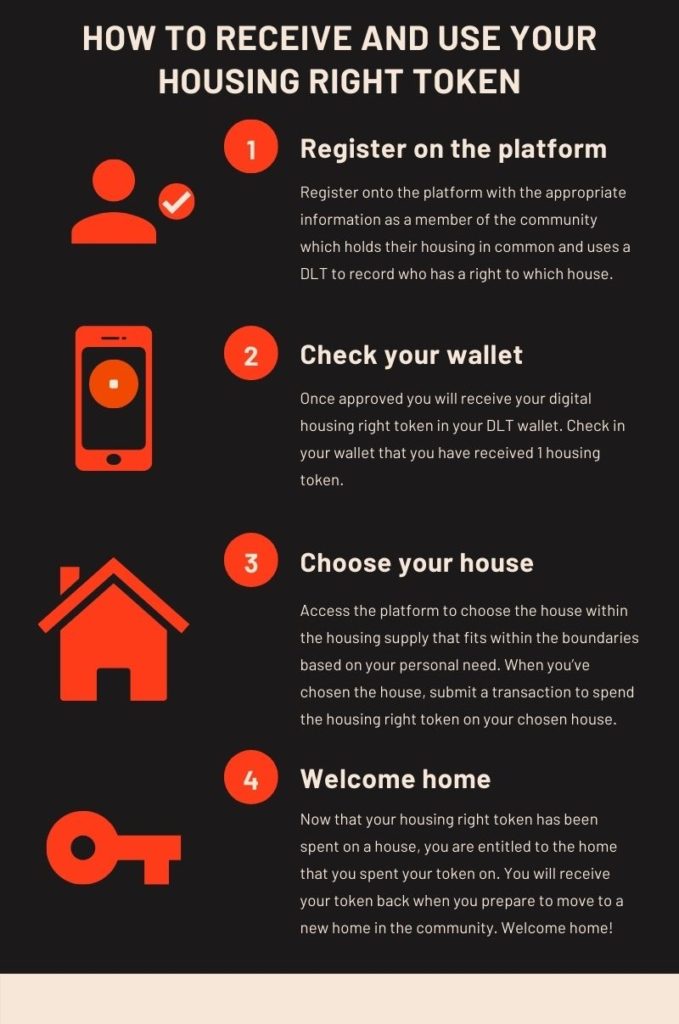
To make it more clear, I’ve created this image to describe how as a user of such a platform they would hypothetically get their home
Obviously the explanation leaves out plenty of details that some may want answers to. For example, how do you guarantee that when someone spends their token, they are physically able to enter their home or that bad actors won’t physically take their home? One could flip the idea of landlords using blockchain enabled smart locks to keep non-paying tenants into one where the smart locks allow only the one holding the correct address to its associated housing right token owner. The other is that this is a system that cannot simply be implemented to guarantee housing for all, this would require a shift of currently existing productive relations between people in the realm of housing. What this is proposing is NOT a techno-utopian solution. This is meant to be a techno-social solution in which social movements can know how to use technology to create the future they want to see.
The choices that we are given to govern the way we distribute housing are essentially:
1) through a market in which people purchase their homes (many times multiple homes, driving up prices) as private property with the money they make by either selling their labor on the market or usually with the capital they’ve accumulated through investing (sometimes by being a landlord) which leaves out those who are unable to accumulate enough money to purchase a home so they either rent or are homeless, or
2) people come together to hold housing as public property in which everyone is given a right to housing and is distributed by need which is what this use case is attempting to achieve using modern technology.
Another advantage of this system I think is that it still allows for choice similar to how market defenders will describe markets. Many market defenders will say that only markets are able to give choice to people, however markets do not equal choice. It’s not a choice if you’re choosing between a rent or mortgage you can barely afford and being homeless. This solution gives a more realistic approach to choice based on the housing supply and prioritizes the needs of citizens.
One of the inspirations for this idea comes from Chapter 6: Dwellings in the book The Conquest of Bread by Peter Kropotkin in case people want to look deeper into leftist theory on housing distribution.
OK but why do we have to use blockchain? Can’t the State do it?
Good question! Technically yes, we can do a lot of what it takes to put housing under common ownership without DLT. What I think this question is actually about is political strategy and theory of change. Some may lean on the belief that the state is the only or best way to create change towards socialism in which case they may think this idea is silly.
The State may trust itself, but do you trust the State to uphold your rights forever? I think it’s clear that our rights are many times used as political capital between political parties that can come and go based on what’s convenient at the moment for those in power. People may protest but the average person is still far away from the levers of power. I am more in the belief that it would last longer and be more secure if you could adhere to a strict democratic protocol that is facilitated by citizen input and starts to resemble the idea of Engels, of a “government of persons replaced by the administration of things.”
I say all this but I want to be clear that I’m not against experimenting with the idea alongside supportive state actors (most likely only to happen with members of a left wing party). I think there could be a way to implement this under the direction of the state but, only if it’s radical enough will it also seize property from the wealthy (which is rare to see but who knows for the future) if they want to ensure housing for everyone or more likely, start it as an experiment with social housing, although I think the full value of this idea I think could only be realized if most if not all housing was held in common.
However this still means that the State will need to be a bit more innovative than usual because in reality they can do it with their own databases, but this isn’t the issue. The issue in fact is NOT a technological one, it’s a political one. The issue is how long is it going to last before reactionary forces (including landlords probably) do their best to undermine it especially considering the issue of corporate capture of the State. Keeping it as a government database makes it a central point of attack, both technologically and politically, whereas a solution which is “decentralized” is much more resistant. The bitcoin network itself has never been hacked but how many times have government databases? It’s a lot. So I think this approach, when it includes the appropriate democratic inputs, is more resistant than a purely state created, owned, and executed one.
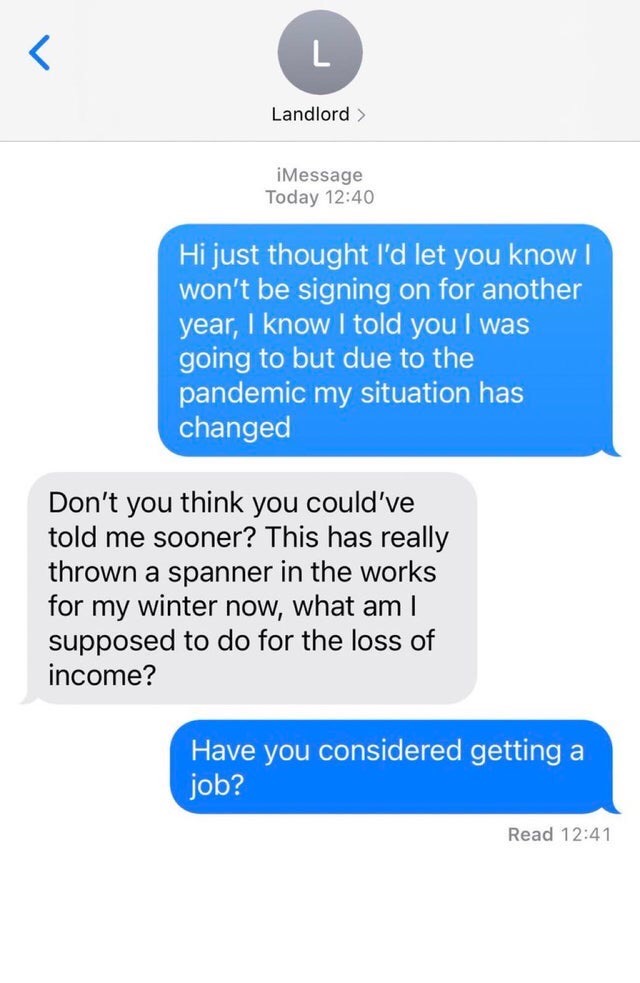
The function of a landlord does not bring any value to society
The truth is that there may be more objections to this proposal but it’s difficult for me to fit every possible objection in just one article so I hope you’ll be patient and feel free to reach out to me directly if you would like a clarification or if you think an organization you are a part of would be interested in exploring this idea further. You can also check out a recent article from MEL magazine where I spoke a bit about this idea as well.
By the time this is published, rent will already have been due three days ago for families across the United States where either the amount of money they owe their landlords has increased or the landlord has a found a loophole to still evict their tenant. If you hated reading this and are angry at me for committing the heinous act of utopian dreaming, at the very least, I hope you’ll consider helping the activists in New Orleans fighting for renter’s rights at JPNSI.
If you liked the article and want to explore more socialist blockchain use cases, please consider donating to my Patreon so I can continue to give a voice to the intersection of blockchain and the Left without advertisements. Be sure to sign up for the Newsletter, follow me on Twitter (@TBSocialist), and join the r/CryptoLeftists subreddit!

